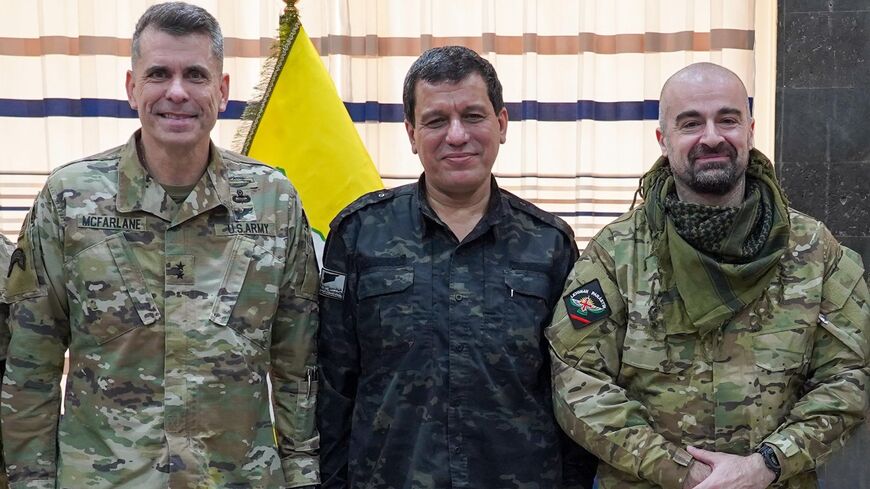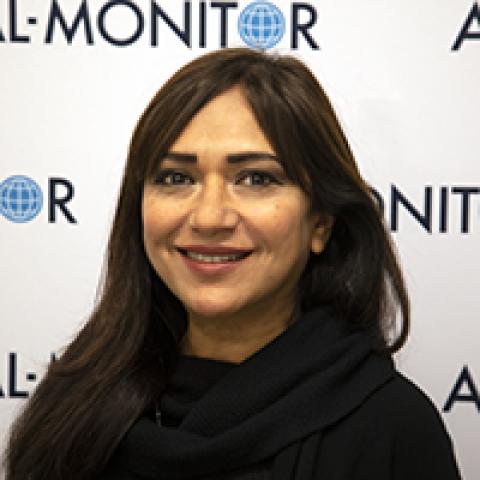QAMISHLI, Syria — The Kurdish-led administration in northeast Syria is seeking the United Arab Emirates’ help to broker a deal with the Syrian regime amid fading confidence in the United States and Arab outreach to Damascus, Al-Monitor has learned.
Mazlum Kobane, commander in chief of the Syrian Democratic Forces (SDF), the United States’ premier ally in the fight against the Islamic State (IS), recently traveled to the UAE, four well-informed sources and officials in the region speaking on condition of strict anonymity told Al-Monitor. Kobane met with UAE officials, two of the sources said, in order to seek Abu Dhabi’s help to press the Syrian Kurds’ case with the Assad regime. One of the regional sources said that Kobane met with the UAE’s national security adviser Tahnoun bin Zayed al Nahyan, who was named deputy ruler of Abu Dhabi on March 29.
The UAE denied that any such meeting had occurred.
"The claims referenced in your email are false and unfounded,” a UAE official said in an emailed response to Al-Monitor’s request for comment on the UAE's alleged mediation effort between the SDF and the regime.
The officials briefing Al-Monitor insisted that Kobane had indeed gone to the UAE between late March and early April. None provided specific dates. “It is one hundred percent true,” one of the officials said. Two of the officials briefing Al-Monitor said that Bafel Talabani, leader of the Patriotic Union of Kurdistan (PUK), the second largest party in the Kurdistan Region of Iraq that shares power in the Kurdistan Regional Government, had traveled with him.
Talabani’s office did not respond to Al-Monitor’s request for comment.
Badran Ciya Kurd, the de facto foreign minister of the Kurdish-led Autonomous Administration in Northeast Syria, confirmed that the UAE had expressed interest in helping the Syrian Kurds strike an agreement with the Assad regime. “They said they are ready to help, but so far we do not have a program (roadmap) for this,” Kurd told Al-Monitor in an April 28 interview in Qamishli. "We want them to play a role in the talks with Damascus, Kurd added. He declined to comment on whether Kobane had recently traveled to the UAE.
Ankara strikes
Kobane’s alleged trip to the UAE capital came before he was targeted by a Turkish drone as he was traveling in a convoy from the PUK’s intelligence headquarters known as the Counter Terrorism Group, or CTG, in Sulaimaniyah on April 7. The officials briefing Al-Monitor said the drone strike took place following Kobane’s return from the UAE.
The convoy was headed toward Sulaimaniyah International Airport. Kobane was to fly back to northeast Syria on a plane operated by the US-led coalition against IS. The CTG chief, Wahab Halabji, and three US military personnel were in the motorcade, as was Ilham Ahmed, a top Syrian Kurdish official. The Turkish drone is widely believed to have deliberately missed the target, and Kobane made it home. The goal was to telegraph Ankara’s fury over the shuttling of Kobane by the PUK leader to the UAE, one of the officials briefing Al-Monitor speculated.
On April 5, Turkey announced that it had sealed its airspace to planes taking off from and landing at the Sulaimaniyah airport, ostensibly after hearing of Kobane's assignation in Abu Dhabi, the sources said. The Turkish Foreign Ministry said the measure stemmed from an alleged “intensification of the PKK terrorist organization’s activities in Sulaimaniyah [and] infiltration by the terrorist organization into the airport.” The PKK is the acronym for the Kurdistan Workers’ Party, the outlawed militant group that has been waging an armed campaign for Kurdish autonomy against the Turkish state since 1984. Ankara insists that the SDF and Kobane, who also goes by the surname “Abdi,” are all PKK “terrorists” because of his previous role in the PKK.
Turkey said it would reassess its decision on the airport on July 3 based on measures the PUK takes to curb the PKK’s activities in Sulaimaniyah. Turkey is the Kurdistan Region’s main gateway to Europe.
The PKK was instrumental in the early days of the US-led coalition’s battle against IS, wresting thousands of Yazidis from the jihadis’ jaws in Iraq’s Sinjar region and training fighters for the SDF. However, it was listed as a terrorist entity by the State Department in 1997, hence Ankara’s ire over Washington’s effective collaboration with the group.
Washington insists that the SDF and the PKK are different and says some 900 US special forces stationed in northeast Syria as part of the anti-IS campaign will not be withdrawn. However, confidence in the United States is waning.
The first big shock came in 2019 when the Trump administration greenlighted a Turkish invasion of large swathes of Kurdish-controlled territory, including the key towns of Tell Abyad and Rais al-Ain, also known as Serekaniye. The US withdrawal from Afghanistan was another wake-up call, said Fawza al-Yusuf, a leading official in northeast Syria. “Our relations with the United States have been in decline since 2019. Serekaniye and Afghanistan provided lessons,” she told Al-Monitor in an April 27 interview in Hasakah.
Yusuf acknowledged that while the United States' presence gave the Syrian Kurds leverage in their relations with Damascus, there was also a flip side. The Syrian regime insists that the Kurds sever ties with Washington and tell the Americans to leave as a prerequisite to any deal.
“Thus, the presence of the US forces provides the regime with an excuse to not engage with us,” Yusuf explained.
She added that trust in the Russians, the regime’s main ally alongside Iran, was diminishing in parallel with the Kremlin’s deepening ties with Ankara. The Kurds needed to take matters into their own hands and not be reduced to “objects” in regional power games. Diversifying their partners is part of that strategy.
Bridge building
The UAE has taken a lead role in building bridges between the Assad regime and fellow Arab states in recent years after reopening its own embassy in Damascus in December 2018, part of a race for regional influence aimed in part at thinning Turkey's and Iran’s grips over Syria. Engagement with the Syrian Kurds is part of that calculus.
“The anti-Iran and the anti-Islamist agenda have been the driving force for Emirati normalization with Assad,” said Dareen Khalifa, a senior analyst at the International Crisis Group who follows Syria. The UAE justifies the outreach on the grounds that “Assad isn’t going anywhere and we are going to have to deal with him in one way or another if we want to preserve our interests in Syria,” Khalifa told Al-Monitor.
Charles Lister, a senior fellow at the Middle East Institute and director of its Syria program, contended that the UAE is "trying to be ‘friends’ with everyone, playing mediator everywhere possible and getting into the door of troubling places before anyone else to secure the competitive advantage."
“Ultimately, the UAE’s forward-leaning role in normalizing Assad was initially promoted by a desire to counter Turkish influence, but it’s now principally about securing a competitive advantage — being the Sunni Arab actor with Assad's regime in its pocket and, it no doubt hopes, the first to win large-scale economic contracts if and when Western sanctions are dropped or fail to have their deterrent effect,” Lister told Al-Monitor.
While the UAE may justify its rapprochement with Damascus on the grounds that this will help counter Iranian influence in Syria, the two are top trading partners and Abu Dhabi has hosted top Iranian officials, including Iranian National Security Advisor Ali Shamkani in March.
It remains unclear whether the UAE's efforts to secure approval for Syria’s return to the Arab League during a May 19 summit in Riyadh will succeed. But the UAE is unlikely to give up the push to legitimize Bashar al-Assad. Moreover, it is also believed to be involved in back-channel diplomacy between Ankara and Damascus. UAE meddling apparently angered Tehran, which reportedly leaned on Russia and Turkey to drop the Emiratis from an April 4 meeting with Syrian officials that was held in Moscow. The Iranians took part instead.
In 2018, around the same time the Emiratis reopened its embassy in Damascus, the Syrian Kurds began seeking engagement with the Assad regime. The Russian-induced effort has proved fruitless so far. The regime has rebuffed all of the Kurds' demands for linguistic and political rights. The most the regime offered according to sources familiar with the talks was two hours of Kurdish-language instruction per week.
A fresh sense of urgency appears to have set in as Arab governments, including heavyweight Saudi Arabia, weigh normalization with the Assad regime. Worse, Assad’s longtime nemesis Turkey is also courting Damascus in the hope of reviving a security alliance targeting the Kurds.
On April 18, the Kurdish-led self-administration issued a nine-point declaration reiterating its intention to reach an agreement with the regime. This included an offer to host millions of Syrian refugees currently residing in neighboring Jordan, Lebanon and Turkey. “We need to reach out to the Syrian people wherever they are to erase negative feelings about our administration. This includes members of the Syrian opposition. We can build a new democratic Syria only if we are united,” a senior figure in the Kurdish movement told Al-Monitor on condition that he not be identified by name.
Kurd, the de facto foreign minister, said the Syrian Kurds would not compromise on two things. One was the administrative model that they had set up. “The regime has to recognize the self-administration,” he said. The second is the status of the SDF. While the Kurds are willing to fall under the overall command of the Syrian army, they insist on keeping their forces in their own region.
Seeds of an alliance
The UAE is part of the 85-member Global Coalition against IS. The sources briefing Al-Monitor said that formal contacts between the Kurdish-led self-administration and the UAE started in 2018 when Emirati officials traveled to northeast Syria to interrogate imprisoned UAE nationals who had joined IS. The ties were brokered in part by former PUK intelligence supremo Lahur Talabani, who was ousted in 2021 by his cousin, PUK leader Bafel, in a bloodless coup. Talabani lobbied the Emiratis to invest in Syria’s battered oil infrastructure that lies mainly in the Kurdish-controlled northeast, where most of the country’s oil is located. The top ask was an oil refinery. Talabani traveled to Abu Dhabi with Kobane a number of times to push his cause, sources familiar with the outreach said.
But the Emiratis were wary of upsetting Assad, the sources said. They would have been even more concerned about violating US sanctions on Syria.
The moves coincided with spiraling tensions between Turkey and the UAE over the conflict in Libya where they backed opposing sides. These have since subsided, and it remains unclear whether the Emiratis would be willing to support the Syrian Kurds at the expense of their newly repaired ties with Ankara. The stiff Emirati rebuttal over Kobane’s trip suggests they are not.
Syrian Kurdish officials, however, remain upbeat about the relationship. Yusuf praised the UAE for its “constructive and positive approach." “We have good cooperation with them in intelligence sharing, in combating drug trafficking,” she said.
She noted that the UAE was the Arab country with the fewest nationals to have joined IS. “There were only 15 of them, and the Emiratis were very helpful in the fight against DAESH,” she said, using the Arabic language acronym for the jihadis.
Yusuf added that the UAE’s own system of seven separate monarchies united under the same flag bore some resemblance to the decentralized model the Kurds are seeking for Syria. “We have some common traits,” she said.







